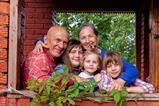Hannah Wickens shares some of her own experience of reaching her forties, and suggests some ways we can reframe the future as a place of hope rather than sad decline.

Psychoanalyst Elliott Jaques first coined the phrase ‘midlife crisis’ in 1965, in response to his own existential questioning of life. He cited a society-wide proclivity toward cognitive decline and lack of physical prowess, in approaching the mortality mark. Midlife became synonymous with erratic behaviour - a permissive cover to stifle insecurity and fear.
Whether it be perimenopause or a lack of applause around life achievement or groans of fading beauty, there is plenty to mourn in unrealised childhood aspirations, with a feeling of life slipping away and the reality of unremitting body alterations.
Yet instead of pronouncing our forties as the initiation of a degenerative slope, we can reimagine it in the light of the freedom Jesus paid for
Yet instead of pronouncing our forties as the initiation of a degenerative slope, we can reimagine it in the light of the freedom Jesus paid for - where we’re not bound by traditional perspective but can rejoice in the prospect of eternal life. A readjusted lens dares to accept the hot flush era whilst imagining a future of opportunity.
My recent excursion to Specsavers gave scope to reframe my perceived frailty into a reflective moment to demonstrate joy. The Ophthalmologist when seeing my vision was declining announced, “This is the start of the change”, whereby a guttural cry of ‘Nooo’ burst out as I desperately clamoured to maintain dignity and hopes of longevity for my tired eyes. Simultaneously, a fresh-faced girl escorted me to the frames. I realised an internal battle, with her apparent ease of youth in contrast to my vulnerability. I chose to be gracious and joyful in this tender moment, to steer the narrative in a different direction.
Chava is the Hebrew for Eve, who was the original incarnation of femininity, and means life in abundance, evidence of God’s design for womankind. We can reimagine our lives within this truth. Often, it’s when we reach our forties that we find contentment in who we are and confidence to express ourselves beyond youthful self-consciousness. As we advocate for ourselves and others, new pathways are forged for the next generation, where we resolve to accept what we can’t change and find courage to change what we can.
Recently my 19-month-old daughter (I had her in my early forties) was dismantling a discarded snail shell. I marvelled at the intricate beauty of this shell and wondered if snails can rejuvenate their casing. In fact, they keep the same shell that grows with them; a curator at the Natural History Museum noted that “it’s like each shell is a snail’s autobiography”.
The human trajectory could be similar in that we continuously build upon previous experience, learning and evolving; and in this regard we protect our brains from neurodegenerative diseases too. Additionally, by harnessing a playfulness we can boost immunity and prolong youthfulness. George Bernard Shaw said, “We don’t stop playing because we grow old; we grow old because we stop playing.”
George Bernard Shaw said, “We don’t stop playing because we grow old; we grow old because we stop playing.”
My own body thrives on a balance of age-informed nutrition and exercise. I subscribe to The Yoga Abbey, an online community of believers seeking wholeness with biblical foundations. They’ve constructed a nourishing program for women, discussing remedies for hormonal fluctuations and psychological shifts alongside rhythmic flow exercises and scriptural meditations. Outwardly our bodies are changing, but we can work with them to enhance what we have whilst renewing inwardly.
Without hope we perish but with it, anything is possible, especially when paired with divine strength. The aging process recedes when belief aligns with Biblical truth as hope literally restores in for the form of epigenetics.
Read more on growing older
I thought I wanted to grow old disgracefully, but I’ve realised that I’m actually a ‘Queenager’
Our DNA is vibrant in that we share a lineage of grace with women such as Sarah, wife of Abraham, who bore a child in her 90s and was desired by two kings in her advanced years. The unconditional love of God and his rhema word breathes life into dry bones.
We read of our youth being renewed like an eagle’s (Psalm 103) which isn’t a literal biological transformation aside from a shedding of plumage to make way for new feathers – but strength is restored with eating and our vibrancy is dependent on consuming the Word that renews our minds.
Happily, too, eagles have keen eyesight, and I’m grateful for Heavenly vision and perspective.




































1 Reader's comment